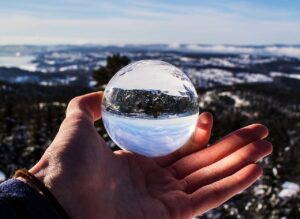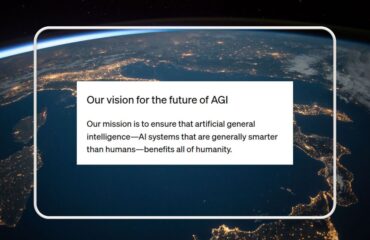
Dealing with uncertainty is a fact of life, since none of us has a crystal ball to see into the future. Changing mindsets on Nature’s potential may hinge on quantifying and trading on the bets we make on Nature’s future every time we use a natural resource. Image: motivatorsworld, of Pixabay
Often intense political challenges to climate change action, either within countries or between countries, are rooted in an unwillingness to give up some of what we have today to invest in the potential of a far greater tomorrow. The one thing about potential, however, is that by its very nature its value will never be zero.
Today is certain, every day after today is increasingly uncertain, and the more uncertainty there is the more we risk losing on our future bets. But it’s actually possible to quantify our bets on the future. We already do that, and changes in interest rates tell the story.
In fact, the rapid increase in interest rates in 2022 was a very clear sign that our bets on the future were turning sour, and as the value of the future decreased, our discount on the future – which is what we call “interest” – increased. The damage of high interest rates will play out in mortgage payments, home prices, stock prices, and bond prices for years to come.
We already attach values to financial futures and derivatives – things like stocks, bonds, puts, calls, swaps, futures contracts, and cryptocurrencies – and we trade them on the markets without entirely objective measures. Trillions of dollars and all other currencies are traded and exchanged every day, while profits are made and lost as value transfers from one hand to another. A trade is a bet – and the good traders make informed bets – but no trader has certainty of future outcomes.
Money is a financial future, if you think of money itself having no value but representing the value of the promise for which it was received or given. Unless a trade is executed through a neutral intermediary like a trustee, the exchange of value isn’t instantaneous – there’s a bit of time, sometimes the tiniest bit, between the point that the buyer initiates the trade and the seller completes it. If the buyer is required to prepay, then the seller thinks the buyer’s promise is worth less than his own. If it’s the reverse, and the buyer receives the goods before handing over the money, the seller places value in the buyer’s promise. And so promises are traded unequally as money changes hands over time.
A result of inherent uncertainty in the future is that some traders suffer for the benefit of others. This is not a flaw inherent in a properly-designed market, one with clear data flow that is simultaneously available to all traders. Rather, such markets are self-balancing since, on the basis of experience, traders can adjust beliefs in making their next bets, with different outcomes and greater potential for alignment with value.
The thing is, there is no inherent value in any of the financial futures that we already trade – their only value derives from the relative belief of the traders in the future potential of the thing that is being traded in the present.
If we have natural intelligence, then could we not create similarly agreed-upon measures of value for Natural Futures, and begin trading in them?
The volumes and frequencies of trades from one minute to the next in a Natural Futures Market would establish the relative values of the things that are being traded, based on the informed beliefs of the traders.
What would be traded in the Natural Futures Market? The same things that are traded in stock markets, bonds markets, currency markets, and any other market could be traded in a Natural Futures Market. The existing capitalist system would continue, but with an environmental derivative added to the varieties of markets that are already active. We already have markets for interest rate swaps, credit default swaps, options, futures contracts, stock index derivatives, and many more promises that we trade every day. What difference would another market make, in addition to the others, for us humans who are the ultimate source and purpose of all markets?
An oil company’s shares, for example, could be traded on a Natural Futures Market, together with shares of an electric vehicle maker – and the values of the traders’ bets on the future would be based on the environmental outcomes of each company’s activities. Which investment would have the greatest present value, in this scenario? Surely it would be the one with the longest future potential – because its promise, and the value of its promise, would continue to multiply in time after the other stops. The question is, how long will the multiplication continue, and is it worth the wait? We only have so much time to spend.
The measurement of Natural value need not be perfectly objective, and certainly our existing financial measurements have inherent uncertainties, depending as they do on the beliefs of the traders.
The keys to the success of any futures trading – whether it’s trading in stocks and bonds or in Nature’s values, are:
- general agreement on the basis of measurement
- general agreement that every trade constitutes a single measurement, with no possibility of double-counting the outcome
- general agreement on a fair means of dealing with imperfections that arise over time
- general agreement on mechanisms to reduce random volatility and unnatural friction, and
- general agreement on the objective.
By definition of the future, there can only be, ultimately, a single objective when betting on the future, and that is to extend the future’s limits beyond any number, and most certainly beyond any imaginable limit. That way, the greatest value is created. Any trader will tell you that an investment with a limited future is worth less than one whose future is unlimited; this is the effect of compounding in the concept that accountants and financiers call “present value.”
In a Natural Futures market, any belief among traders in a future of lesser value would be counterbalanced by a re-weighting of value.
In the re-weighting, the value would not necessarily shift to the present generators of of the greatest current value, because their time value – which is the length of time the promise of their goods or services will be of any use – is potentially limited. Promises hold value over time, but the greatest imaginable discount on the value of any promise over time would never reach infinity – because time is a necessary precursor to both the promise and the imagination of the promise.
We would find the greatest imaginable value of time in today’s value-generators that, in combination with others of similar mindsets, form the mean of the greatest possible future increase in all value.
The thing about the mean of any measure is that it always leads to the extremes of all measures. Since our lives and everything we do depend on it, Nature is the ultimate extreme – it always has been and always will be, by the very nature of the Universe. Think of the mean as the line that cuts through the middle of all trades, some trades being of greater magnitude and frequency than others. Over time, that line of the mean would always faithfully mark the path from the first trade to the last. The account of the trade is in the mean.
The mean, in Heisenberg’s universe of uncertainty, is golden. Imagine navigating uncertainty like riding a wave in an ocean. The mean is the calm place, a place of no difference, among all those waves of uncertainty. The mean is where the greatest mass, or greatest energy was, is, and always will be. And the middle between greatest and least, which always leads to the mean, is the place in the present that determines its own fate. The fate of any value measurement is a constant – it’s a concern of our present, was a concern of our past, and will be a concern of our future.
By Birthright, We Bear Responsibility for Nature’s Guardianship
Would the traders on a Natural Futures Market be entitled to all of the trading profits, after the cost of operating the market is covered? No, because the market would be established as a not-for-profit entity and charge “rent” on each trade, to sustain Nature’s fair due for generating the underlying value. An analogy might be to an internet service provider that pays rent for bandwidth on the fibre transmission lines of a utility, like a phone company. The trading rents would be applied to a Natural Guardianship Trust, the goal of which is to protect the value of Nature, and the concept of value, which is the object of the trade.
The Natural Guardianship Trust would act like an insurance policy, ensuring preservation of the value of Nature on whose basis the trades are being made.
If, for example, I make a trade today on a developing future technology that requires clean water for its input, and outputs the same amount of clean water with zero net use of water resources, then I would want clean water to be available in the future. Otherwise my trade will be worthless.
The logic of acting as responsible guardians of the Earth is inescapable, since every cell in our bodies is ultimately born from the biological elements of the Earth, and at life’s end it is to the Earth that our cells will return.
It’s the fundamental power of Nature over humanity, and a power that Nature wields only when balance needs to be restored. Ultimately, Nature is the silent but all-powerful landlord, and we are the tenants in a free lifetime lease with Nature. Nature demands no rent from us, as tenants, and Nature is an even more bountiful landlord in giving freely to us all of its rewards when we work in harmony with it. But by its logic as a self-balancing mechanism, Nature has no choice but to make us face the consequences when we tip Nature’s own balance. The landlord always wins, in any situations like that, and offers us no court of appeals to plead our excuses.



